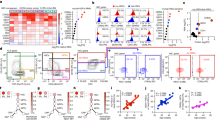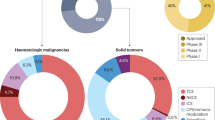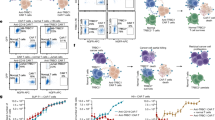Abstract
MONOCLONAL antibodies can be produced by cultures of permanent cell lines derived by fusion of suitable myelomas with spleen cells from immunised animals1. So far, mainly two mouse myelomas, X63-Ag8 and NSI/1-Ag4.1, have been used for this purpose1,2. When cells from immunised mice are used in the fusion, the mouse × mouse hybrid myelomas can be grown as tumours in appropriate mouse strains. We describe here the preparation and use of a new clone of a rat myeloma, which is suitable for the derivation of rat × rat hybrid myelomas producing specific rat antibodies. The spent medium of hybrid myeloma cultures usually contains 1–20 μg ml−1 antibody. The serum and ascites of the tumour-bearing mice, with few exceptions, yield 1–20 mg ml−1 of antibody, which is 1,000 times more concentrated and very convenient for larger preparations.
This is a preview of subscription content, access via your institution
Access options
Subscribe to this journal
Receive 51 print issues and online access
$199.00 per year
only $3.90 per issue
Buy this article
- Purchase on Springer Link
- Instant access to full article PDF
Prices may be subject to local taxes which are calculated during checkout
Similar content being viewed by others
References
Köhler, G. & Milstein, C. Nature 256, 495–497 (1975).
Köhler, G. & Milstein, C. Eur. J. Immun. 6, 511–519 (1976).
Galfrè, G., Howe, S. C., Milstein, C., Butcher, G. W. & Howard, J. C. Nature 266, 550–552 (1977).
Springer, T., Galfrè, G., Secher, D. S. & Milstein, C. Eur. J. Immun. 8, 539–551 (1977).
Bazin, H., Deckers, C., Beckers, A. & Heremans, J. F. Int. J. Cancer 10, 568 (1972).
Cotton, R. G. H. & Milstein, C. Nature 244, 42–43 (1973).
Svasti, J. & Milstein, C. Biochem. J. 128, 427–444 (1972).
Secher, D. S., Milstein, C. & Adetugbo, K. Immun. Rev. 36, 51–72 (1977).
Milstein, C., Adetugbo, K., Cowan, N. J. & Secher, D. S. Prog. Immun. 2, 157–168 (1974).
Rocca-Serra, J., Milili, M. & Fougereau, M. Eur. J. Biochem. 59, 511–523 (1975).
Turner, K. J. & Cebra, J. J. Biochemistry 10, 9–17 (1971).
Fruchter, R. G., Jackson, S. A., Mole, L. E. & Porter, R. R. Biochem. J. 116, 249–259 (1970).
Edelman, G. M. et al. Proc. natn. Acad. Sci. U.S.A. 63, 78–85 (1969).
Poljak, R. J., Amzel, L. M., Chen, B. L., Phizackerley, R. P. & Saul, F. Proc. natn. Acad. Sci. U.S.A. 71, 3440 (1974).
Author information
Authors and Affiliations
Rights and permissions
About this article
Cite this article
GALFRÈ, G., MILSTEIN, C. & WRIGHT, B. Rat × rat hybrid myelomas and a monoclonal anti-Fd portion of mouse IgG. Nature 277, 131–133 (1979). https://doi.org/10.1038/277131a0
Received:
Accepted:
Published:
Issue Date:
DOI: https://doi.org/10.1038/277131a0
This article is cited by
-
Recognition of DHN-melanin by a C-type lectin receptor is required for immunity to Aspergillus
Nature (2018)
-
Expression of GIMAP1, a GTPase of the immunity-associated protein family, is not up-regulated in malaria
Malaria Journal (2009)
-
From the Structure of Antibodies to the Diversification of the Immune Response
Bioscience Reports (2004)
-
Combination therapy in mice: what can we learn that may be useful for understanding rheumatoid arthritis?
Springer Seminars in Immunopathology (1998)
-
Production and evaluation of monoclonal antibodies for the detection of beet mild yellowing luteovirus and related strains
European Journal of Plant Pathology (1996)
Comments
By submitting a comment you agree to abide by our Terms and Community Guidelines. If you find something abusive or that does not comply with our terms or guidelines please flag it as inappropriate.



